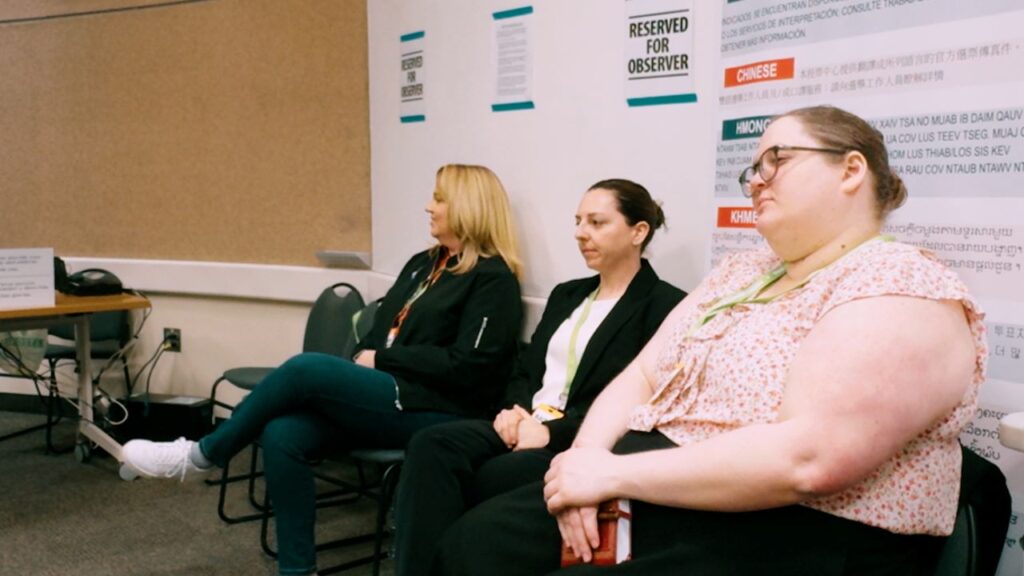Cheryl Cotton, the new superintendent of the West Contra Costa Unified School District, holds a photo of her first-grade class, which was taught by her mother, a teacher in the district for 42 years. (EdSource/Louis Freedberg)

- West Contra Costa Unified’s new superintendent, Cheryl Cotton, has multi-generational ties to the district.
- Like many superintendents, Cotton faces challenges such as financial uncertainties, more potential cuts in federal funding, and political attacks.
- At least a dozen California school districts have new superintendents, including San Diego Unified’s Fabi Bagula and Fresno Unified’s Misty Her.
Share
|
Getting your Trinity Audio player ready...
|
It is hard to imagine a more “homegrown” school superintendent than Cheryl Cotton, who in June assumed the top post in the West Contra Costa Unified School District on the eastern edge of the San Francisco Bay.
Increasingly, school boards have turned to candidates like Cotton, who are familiar with their districts, as a hedge against the rapid turnover in leadership that has plagued many school districts.
After five years as deputy superintendent for public instruction at the California Department of Education, she was eager to return to working closer to children, for the first time as a superintendent, and in her hometown no less.
“This is home for me,” she said when asked why she decided to take the job, referring to her multigenerational roots in Richmond and the smaller towns that make up the district. “This is my community. This is where I live. This is where I am engaged. So why not here versus anywhere else?”
Answering her own question, she said, “Because I love it.
(This story was originally published by EdSource. Sign up for their daily newsletter.)
A school superintendent’s job has always been one of the most difficult in education because it requires not only pedagogical, but political, skills to navigate the multiple interests in a district.
Now, political skills may be even more important in light of the multiple ideological attacks emanating from Washington, D.C., and elsewhere, and financial headaches due to declining enrollments and the threat of budget cuts, including unpredictable ones that the Trump administration could inflict.
“It’s an especially tricky environment for new superintendents,” said Carl Cohn, a veteran California school superintendent and co-chair of the Collaborative on Political Leadership in the Superintendency
The superintendent turnover rate in California and nationally accelerated after the pandemic. It declined slightly in the last few years, but is still far higher than before Covid upended schools across the state, according to tracking by The Superintendent Lab. Between 2024 and 2025, the superintendency in nearly 1 in 5 (18.9%) of California school districts changed hands.
Some of that, says lab founder Rachel White of the University of Texas at Austin, is because of a “slow but steady uptick in turnover due to what we call attrition in a politicized context or contentious environment.”
Days before schools reopen in West Contra Unified, Cotton’s insights and experiences offer a window into how school leaders, especially in a “blue” state like California, are responding to a fractious education landscape.
At least a dozen California school districts have new permanent superintendents this fall, including San Diego Unified’s Fabi Bagula and Fresno Unified’s Misty Her, who now lead the state’s second and third-largest districts, respectively. Both also have life-long ties to their districts.
Showing a pragmatism forged over many years in and around classrooms, Cotton said she is going to avoid being distracted by political battles being waged around education in Washington, D.C., or elsewhere. “I am focused on 54 schools, a host of classrooms, and 25,000 students who will be here next week,” she said. “We are here to serve all students the best way we can.”
The challenge for Cotton, the first African American woman chosen as the district’s permanent superintendent, is whether her lifelong connections will make a difference.
A Richmond Legacy
Cotton described how her grandfather first came to Richmond from Arkansas in the 1940s as part of the Great Migration of African Americans from the South to work in the shipyards that built Liberty ships that played a part in winning World War II.
Her father attended Stege Elementary, built as a temporary school in the 1940s for the children of shipyard workers. Segregated at the time, it is just now being rebuilt in response to a lawsuit that identified a host of poor building conditions and other problems.
Her mother was a legendary teacher who taught in the district for 42 years.

As a child, she attended district Broadway Elementary in San Pablo, Portola Junior High School in El Cerrito, and graduated from El Cerrito High School.
Her mother was her first grade teacher at Broadway Elementary in 1971. She proudly brings out her first grade class photo, her mother standing in the same row as her.
Her mother told her she could call her Miss Cotton, or just plain “mom,” whatever she preferred. She chose to call her Miss Cotton.
One weekend, she recalls having an argument with her mother about a homework assignment. “I’ll talk with Miss Cotton about this on Monday,” she told her mother.
With teaching apparently in her genes, she also became a teacher and taught in several Bay Area school districts. For 14 years, she was a principal and director of human resources in West Contra Costa.
Her 21-year-old son, Caden Cotton-Blake, was the next generation in her family to attend district schools. In high school, he was the student representative on the school board.
Cotton still lives in the district, as she has her entire life.
So, she comes to her position fully aware of the task at hand and any buried land mines. There should be no surprises.
100 Day Pathway
In her 100-day plan, titled “Building a Stronger WCCUSD,” she acknowledged that the district faces “significant challenges,” including declining enrollments, budget deficits and what she called “inconsistent academic outcomes.” Added to those are ongoing negotiations with labor unions, rising charter school enrollments, teacher shortages, deportation threats to immigrant families and the prospects of more cuts in federal revenue by the Trump administration and political attacks, as well.
These are not abstract concerns.
Two years ago, the district narrowly dodged a teacher strike by signing a contract that expired in June. Seven months of negotiations, which began under her predecessor, interim Superintendent Kim Moses, did not result in a new contract. So, collective bargaining begins on Tuesday again — the first day of the school year.
The district has already felt the impact of the Trump administration’s cuts in federal grants. In May, the U.S. Department of Education cut all but $600,000 of $4.2 million in federal funds awarded during the Biden administration. The funds would have placed social work graduate students as mental health interns in its schools over the next four years. The Department of Education told the district that the grant was “no longer aligned with the goals of the administration.”
Last month, the district faced losing over $4 million in federal funds it was expecting on July 1, which President Donald Trump suddenly impounded. This was the district’s share of $6.8 billion in funds allocated to schools across the nation. Only when some Republican senators objected did Trump change his mind and release the funds. Further rounds of cuts, however, could focus more directly on states and districts in anti-Trump strongholds.
“As an educator for over 30 years,” she said, “it’s heartbreaking to hear conversations about closing the Department of Education.”
She worries about possible cuts in programs for migrant and bilingual education, special education, and Title 1 for low-income students. Cuts like these would have a “direct impact” on student services, she said, and also on the recruitment of teachers and professional development.
And then there are the ideological minefields to traverse on issues ranging from antisemitism, integrated bathrooms for transgender students, and ethnic studies.
These came uncomfortably close to home when Enikia Ford Morthel, the superintendent of the nearby Berkeley Unified School District, was summoned to Washington, D.C., in May 2024 to testify before the same congressional committee that contributed to the resignation of three Ivy League presidents, about alleged “pervasive antisemitism” in her small district.
Ford Morthel was able to deflect and rebut criticisms of her district, and emphasized that her number one job was educating students — her “babies” as she described them.
Opening Dialogue With Labor Unions
As part of her 100-day plan, she pledged to “open dialogue” with labor unions in the next two weeks. She wants to establish a joint labor-management team that would work on “improving staffing, morale and retention.”
Most importantly, she wants to have “honest conversations about our budget.” That includes addressing what she calls the “disconnect between what we have available for salaries and benefits to support our staff, and being really honest about what’s there.”
Francisco Ortiz, president of United Teachers of Richmond, is hopeful she will bring the statewide connections and knowledge gained from her years at the California Department of Education. He welcomed her proposal for a labor management committee. “Hopefully, we can come to a cohesive vision and uplift educators who show up every day,” he said.
Cotton doesn’t need any reminding about the district’s perilous financial situation. She was a high school student when, in 1991, the district escaped insolvency and became the first district in the state’s history to get a bailout loan from the state.
This spring, the district made significant progress when, for the first time in several years, its budget got a “positive certification” from the Contra Costa County Office of Education. That means it expects to be able to pay all its bills for the current school year and the next two. But it only achieved that by cutting $19 million from its budget and digging deep into reserves accumulated over many years.
The district is still operating with a “structural deficit,” which means it is spending more than it is taking in revenues. That will have to be remedied in the next two or three years.
“We will have to do what’s required to maintain fiscal solvency,” she said. In a familiar refrain from superintendents, she said, “My focus is keeping as much of the deficit away from kids, and not cutting things that have a direct impact on them.”
But she acknowledges, “It will require our board to be ready to make some hard choices and decisions.”
State Superintendent of Public Instruction Tony Thurmond lives in Richmond and once served on the district’s school board; his two children graduated from its schools. He said Cotton is “more equipped than anyone” to help lead the district because of her roots in the district, her work in schools and Sacramento, and her temperament.
“She could have been a superintendent anywhere in the state,” he said. “She is always calm and thoughtful, and she knows how to convene leaders and think strategically.”
RELATED TOPICS:
Categories

Kazakhstan to Join Abraham Accords, Trump Says

Chowchilla Police Arrest Two in Connection With Shooting

Who Will Replace Pelosi in Congress?

















